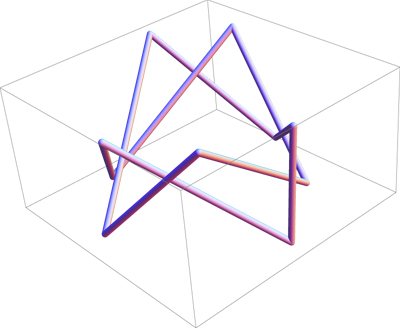I am seeking a function $f: \mathbb{R}^3 \to \mathbb{R}^3$ that has these properties:
(1) When iterated $n$ times starting from some $p$, connecting the points in order with segments and closing last to first,
$$(p, f(p), f^2(p), \ldots, f^n(p), p)$$
results in a simple (non-self-intersecting) closed polygonal cycle $K$.
(2) When $K$ is viewed as a knot, it is highly tangled, e.g., it has large crossing number, or large unknotting number. The tangledness, however defined, should increase with $n$, the faster the better.
(3) These properties should hold for infinitely many $n$.
Expressed differently, I would like a way to generate
an infinite variety of increasingly tangled stick knots
via a simple function iteration.
My requirements are a bit loose, as I just want to
simply generate knotty examples.
Likely some weaving is known to accomplish this...?
Tangled Knot http://cs.smith.edu/%7Eorourke/MathOverflow/TangledKnotFunction.jpg
(This question is intellectually related to an earlier question,
"Complexity of random knot with vertices on sphere.")
